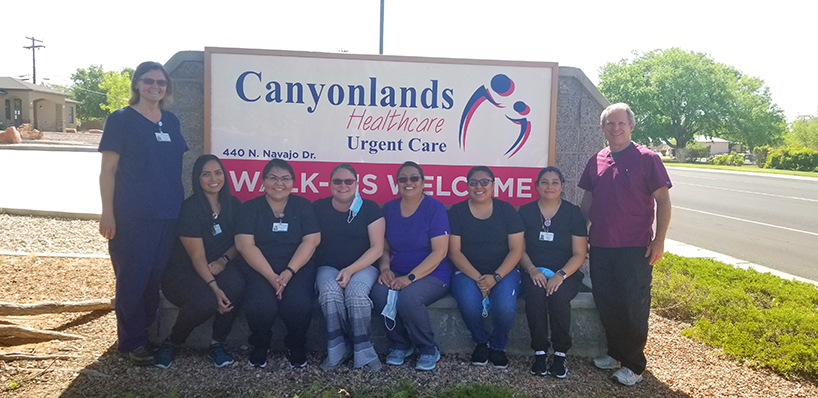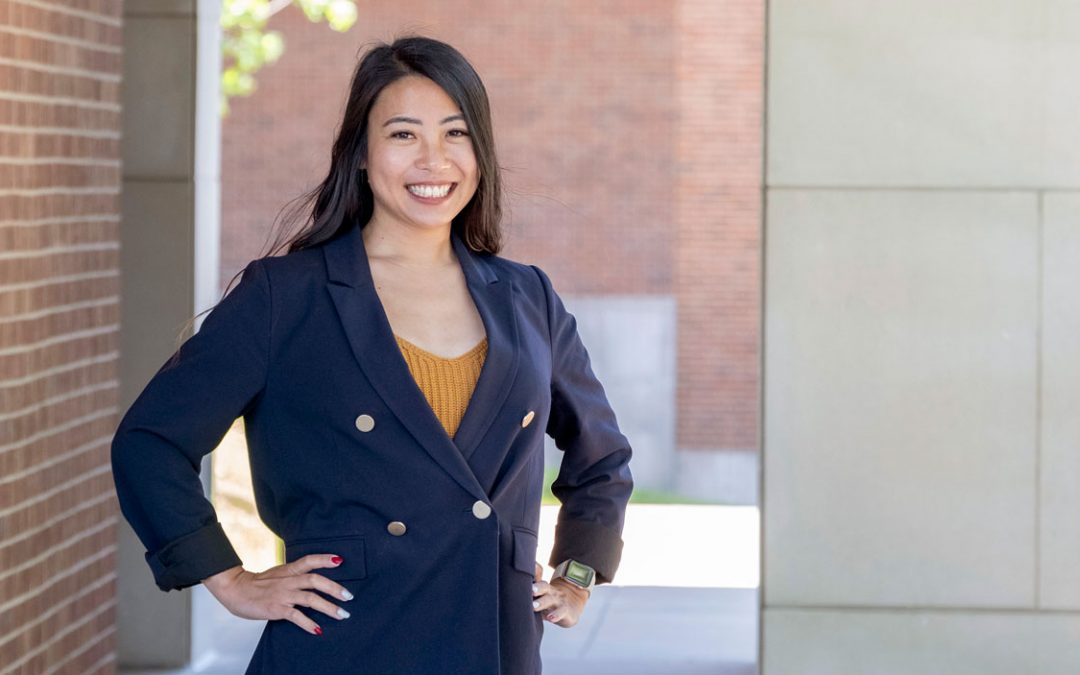
A paper on the Navajo Nation written during her DNP program led Sally Breen to Canyonlands Urgent Care in Page, Arizona. From left: Breen, Brenda Hanson, MA; Tanya Secody,MA; Cyndi Tsosie, CSR; Priscilla Lyons, MA; Miranda Lister, MA; Alejandra Vargas Avilla, MA; Mark Brown, PA-C. (Photos courtesy of Sally Breen)
The whir of helicopters overhead marked the beginning of coronavirus for Sally Breen.
The 2018 University of Missouri–St. Louis College of Nursing Doctor of Nursing Practice graduate would arrive at her nurse practitioner job at Canyonlands Urgent Care in Page, Arizona, and listen as people were flown to Flagstaff, Arizona, or St George, Utah, for critical care from the small hospital across the street. The nearest hospitals are 2½ hours by ground transportation. During that time, she dressed in the same plastic, knee-length blue gown that she’d disinfect and hang to dry between patients.
“We have other gowns, but I feel most protected in these,” Breen said. “If I feel safe, I’m going to keep coming to work.”
It was all part of the surreal experience of caring for patients in a remote town on the edge of the Navajo Nation in the midst of the coronavirus pandemic. Since March, Breen and her colleagues have been dealing with a flood of testing amid changing regulations.
An underserved population
“We’re not on the front lines,” Breen said. “We’re not in the emergency rooms or ICUs trying to keep people alive, but it’s frightening. Patients pull up in their cars, and we can just look at them and see how sick they are. We have to quickly triage and determine if they need emergency care or education on supportive care at home. We turned people away for testing in the early weeks because they did not meet CDC criteria. If we don’t test them, they think it’s OK not to stay home, even though we try to educate them. It’s been frustrating for us, trying to get people to understand how serious it is.”
Canyonlands Urgent Care, a Federally Qualified Health Center, cares for those living both in town and those from the Navajo Nation, a 27,412-square-mile territory that stretches among Arizona, Utah and New Mexico. Coronavirus has brought health disparities and infrastructure differences between the areas to the surface.
Breen estimates that 75 percent of the clinic’s patient population are members of the Navajo Nation. It has been hit harder by coronavirus than some surrounding areas, with the Navajo Times reporting 2,654 cases and 85 deaths as of Thursday. Breen attributes this to a prevalence of comorbid conditions such as diabetes and high blood pressure. Then there’s the lack of transportation and running water that can affect care even under normal circumstances. Part of the Navajo culture is for multiple generations to live in the same household and care of elders and children, which increases the risk of exposure and infection. The Navajo also make up the majority of frontline workers in the area, further increasing their already disproportionate risk.
“I’ve learned that we need to do as much as we can in one visit and provide as much education as we can because we may not see them again as they often go to a clinic in a town they are able to get a ride to, which does not allow for continuity of care or timely follow up,” she said. “They may have traveled as many as two hours to come to town.”
The state of things has gradually improved at the Page clinic as supplies for testing and personal protective equipment have grown. In May, Breen and the Canyonlands Urgent Care team partnered with the Arizona Department of Health Services for three testing blitzes – swabbing over 560 individuals thanks in part to the Banner Health hospital nurses, who are donning PPE in the Arizona heat for 12 hours.
But the existential dread of coronavirus has not totally left yet. Last week, Breen developed a low-grade fever and a headache and was terrified for two days. Then her test came back negative for the virus, and she started to feel better.
One bright spot during a time mostly devoid of light has been the response of the clinic’s staff and its parent company.
“The company that I work for is doing the best they can to get us what we need,” she said. “Everyone is coming to work, bringing our hearts and smiles, washing our hands, wearing our masks and looking after each other.”
Getting to Page
Helping care for an underserved population in a remote town may not have been what Breen imagined when she started her DNP program at UMSL, but the program’s emphasis on the social determinants of health caught her interest immediately.
“We were probably borderline poverty level growing up,” she said. “But the racism and health disparities that compound the problem of poverty experienced by African Americans in inner city St. Louis was an eye opener.”
Breen, along with classmate Lynelle Hinden, took a step toward helping address disparities in St. Louis with their clinical scholarship project, starting an in-residence clinic in Mama/Kaya, a DOORWAYS family residential apartment for HIV/AIDS patients and families.
But it was a different class assignment, a paper on a location for future practice, that married with Breen’s interest in health disparities to ultimately lead her to Page.
She chose to write about the Indian Health Service and learned about health care needs and disparities in the Navajo Nation, then started applying for jobs with the agency before graduation. During that time, she and her husband happened to take a vacation in Page and were instantly smitten by the land’s beauty and its people’s needs.
A position opened up shortly before graduation at Canyonlands Urgent Care. Breen leapt at the opportunity and ultimately graduated with an offer. She’s grateful for her UMSL education, which she feels prepared her to practice in Page both before and during the pandemic.
“What I learned in my 26 years as a bedside nurse has been invaluable to my new role as nurse practitioner,” Breen said. “Nurses have been critical in helping to combat the pandemic. Nurses are brave, resilient and resourceful. We’re trained to protect ourselves and our patients, and we show up every day and bring our knowledge and our compassion and our caring.”














